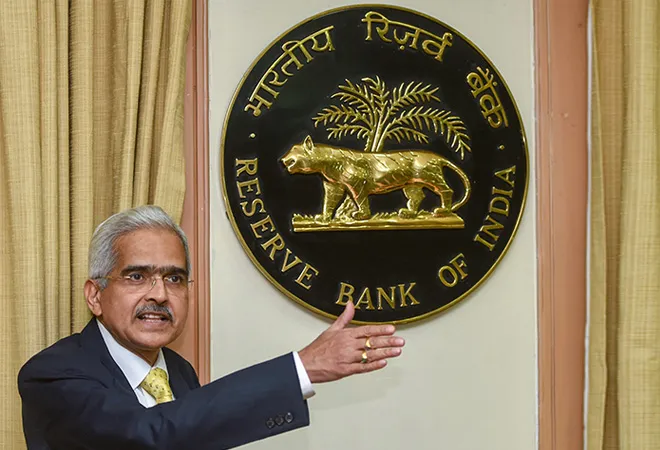
In an unprecedented step or can it be called “historic”, the Central Board of the Reserve Bank of India (RBI) on 26 August decided to transfer record Rs 1.76 lakh crore to the Modi government digging deep into its reserves with an ostensible purpose of extricating the country’s economy from its economic woes that are largely of its own making rather result of external circumstances.
The Rs 1.76 lakh crore includes central bank’s 2018-19 surplus of Rs 1.23 lakh crore and Rs 52,637 crore of excess provisions identified as the revised Economic Capital Framework adopted at the board meeting. The amount is nearly double of the estimated Rs 90,000 crore in the Budget of 2019-20. The transferred amount is over three times the five-year average of Rs 53,000 crore. The move has paved the way for the government to kick-start a much-needed public spending push, alongside possibly paring of the fiscal deficit, estimated at 3.3 per cent of the GDP.
In fact, a long tale hangs behind the latest decision of the RBI that has made itself poorer rather citizens of the country poorer by a whopping sum of Rs 1.76 lakh crore. The BJP-led NDA government had been eying the RBI reserves for a pretty long time.
Two of the former RBI governors namely Raghuram Rajan and Urjit Patel were not very enthusiastic about the government’s desire to use reserves for either fueling economic growth or for controlling fiscal deficit. At one point of time, a section of the ruling party leadership wanted to use RBI reserves for implementing some popular schemes for political objective of winning elections.
After ensuring the exit of two RBI governors, the Modi government decided to appoint a senior bureaucrat Shaktikanta Das on 12 December 2018 to lay hands on the RBI reserves. On 27 December that is within 15 days of taking charge of the central bank, Das responded to the government’s demand for more money and appointed a six-member committee under former RBI governor Bimal Jalan to decide what was the adequate level of reserve the central bank needs to maintain the current Rs 9.59 lakh crore (June 2018) and whether some surplus could be transferred to the government.
The panel, after deliberations, made a clear distinction between the two components of economic capital-realized equity and revaluation balances and recommended that the RBI should rather could use part of the realized equity to meet all risks or losses as they were primarily built up from retained earnings. The revaluation balances could only be reckoned as risk buffers against market risks as they represented unrealized valuation gains and hence were not distributable, the panel said giving ample of scope to the RBI to fulfill the government’s desires.
Terms of the reference given to the appointed committee left very little room for the committee to go into the question whether the government was at all could lay hands on the central bank reserves which were meant to maintain the country’s financial credibility or not. The committee only had to decide how much reserves could be transferred to the government. Thus, it was more than evident that the committee had been appointed to fulfill the government’s agenda and the RBI could not even put any conditions that its reserves would not be used for profligacy or any fancy project of the government. It was clearly an abject surrender of the RBI’s hard-earned autonomy before the government. The Modi government had, thus, wrecked yet another institution.
The country’s economy has been on the downslide because of lack of understanding of basic principles of economy and rules of the financial world. There have been serious contradictions in the spoken word and line of action that has brought the country to an economic precipice.
The government is expected to utilize the excess funds left after the Rs 70,000 crore upfront capital infusion into public sector banks as announced in the union budget for a big capital expenditure. A renewed spending push from the Centre, according to the government, could be the stimulus to counter the economic slowdown. This has become necessary in the wake of investment remaining tepid and private consumption growth falling back. The increased government spending, in most likelihood, is going to boost economic activity as other engines of growth-investment, consumption and exports-have slowed.
Here lies a catch as experts and those in know of the functioning of the government in general and of the Modi dispensation in particular apprehend that this may not result in optimal utilization of funds like it happened in case of disinvestment proceeds or the cess raised on various counts.
Stimulus could give optimal return provided the government is able to meet its revenue targets from taxes and non-taxes receipts. Any shortfall in the government’s earnings could negate the effect of additional spending, taking for granted that the Centre adheres to the fiscal deficit roadmap as outlined in the budget.
Concerns are emerging over weak direct tax revenue collection from the estimates of the five months of the new financial year. In this backdrop, can government afford to push expenditure?
Considerable opportunities have opened for the government to take effective steps to revive the economic growth. The government has to desist from rhetoric and use the available resources prudently. Track record of the Modi 1.0 government does not evoke much confidence but then it cannot be ruled out that the political leadership has drawn necessary lessons from the past.
Problem with the present government is that it is more focused on sustained pan-India political growth of the BJP rather on reforms that will restructure the economy and propel growth. There is an urgent need for liberalizing agriculture, land and labour markets. But is government ready to bite the bullet. Obviously not because political costs are too heavy.
The views expressed above belong to the author(s). ORF research and analyses now available on Telegram! Click here to access our curated content — blogs, longforms and interviews.




 PREV
PREV


